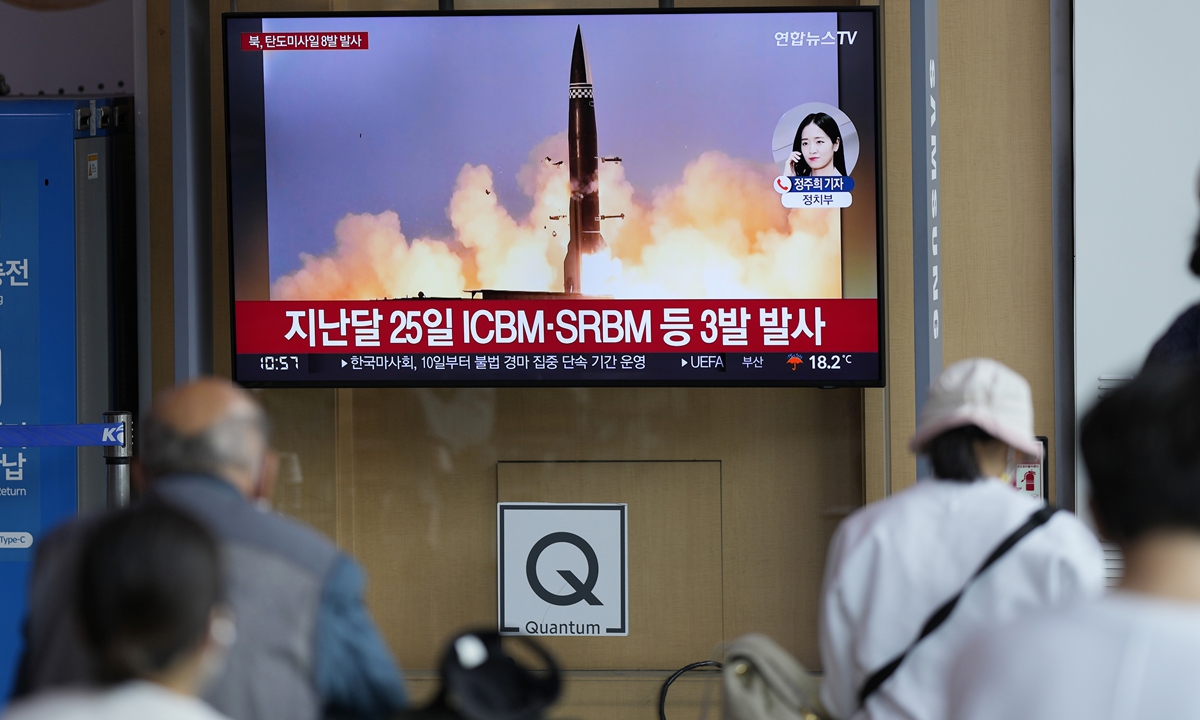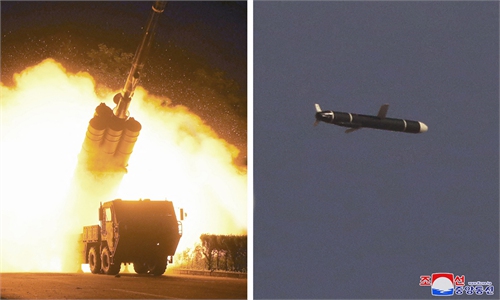Seoul's unprecedented Cyber Flag exercise with US may 'irritate Pyongyang' and 'increase confrontation'

People watch a news report about North Korea's missile launch showing file images at a train station in Seoul, South Korea on June 5, 2022. Photo: VCG
Chinese experts warned of the risk of provoking North Korea and increased instability on the Korean Peninsula, after South Korea's defense ministry confirmed that the country's military is participating in a US-led multi-nation exercise on cyber operations called Cyber Flag for the first time. By increasing cooperation with the US, South Korea is preparing itself to better join the US' regional strategy, experts said.
According to the ministry, 18 personnel from the South Korean Military are joining the joint exercise held from Monday to Friday, which involves 25 countries and aims to "strengthen the readiness among allies against cyber threats and build partnerships," South Korean media Yonhap News Agency reported.
The US Cyber Command has conducted the Cyber Flag exercise annually since 2011, but South Korea had not participated before. Yonhap attributed the country's participation this time to "growing security threats from North Korea."
In addition to addressing the "security threats," South Korea's action also clearly reflect its desire to lay the groundwork for greater cooperation with the US and US-led NATO through cooperation in sharing cyber information, Da Zhigang, director of the Institute of Northeast Asian Studies at Heilongjiang Provincial Academy of Social Sciences, told the Global Times on Tuesday.
South Korea is concerned about North Korea's potential attacks in non-traditional security areas, so it wants to expand cooperation with the US in the area of cyber threat prevention, but this action also reflects its desire to increase interaction and consolidate its alliance with the US and prepare for deeper involvement in the US strategy in the region, Da said.
South Korea's top spy agency, the National Intelligence Service (NIS), took part in NATO's cyber defense exercise Locked Shields twice in April 2021 and April 2022. In May, the spy agency said it had been admitted to the NATO Cooperative Cyber Defense Centre of Excellence (CCDCOE).
In May, US President Joe Biden and South Korean President Yoon Suk-yeol agreed during a summit to deepen and broaden cooperation on critical and emerging technologies and cybersecurity, media reported.
However, the exercise and the intentions conveyed behind it are likely to pose potential concerns for peace and stability on the Korean Peninsula, experts noted.
"Such joint exercises, as well as the previously conducted joint military exercises of the US, Japan and South Korea will irritate North Korea," Da said. "North Korea will certainly be on the alert, which may even lead to further escalation of tensions."
Observers pointed out that the US has a very clear purpose in drawing South Korea into the joint exercises, hoping to pull South Korea completely into the US-dominated camp and system. But it remains unknown whether South Korea will accept it wholesale.
The previous South Korean government always maintained an ambiguous strategy on the issue of choosing sides with China and the US, and the US hopes that the Yoon administration would completely choose the US side, as Yoon seemed to signal before his election, Da said.
However, aware of the extent of South Korea's economic dependence on China, although the Yoon administration has actively cooperated with the US since taking office, it has not exactly tilted toward the US in terms of geopolitical interests. "Although the US will continue to exert pressure, South Korea is not expected to fall all the way to the US as the US expects, given the interests of the business sector and potential of cooperation in other fields," he said.

